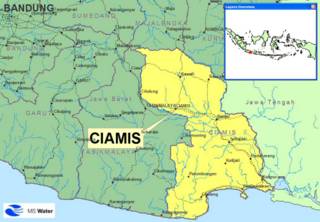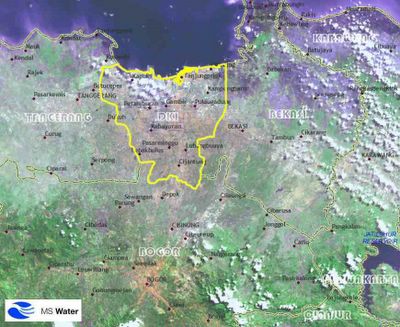New methods bring clean water to slums
Source: The Jakarta Post
English Translation
City News - July 05, 2007
Anissa S. Febrina, The Jakarta Post, Jakarta
An empty paint bucket, a plastic bottle and abundant sun.
For most Jakartans, they would seem to be worthless. But, for Ipah, a mother of six living under the city's flyover in Teluk Gong, West Jakarta, these things make clean water and sanitation less of a luxury.
"It has been months since my toddlers had diarrhea," Ipah said as her children played around a stack of trash in front of her concrete shaded home.
The neighborhood Ipah and dozens other families live in makes a perfect breeding ground for bacteria, but the risk has been minimized since they came upon simple and affordable methods to treat water.
"We have been using Air RahMat for several months now. It's simple and cheap," said Encum, a neighbor.
Using their usual source of water from the local public tap plus a few drops of liquid sodium hypochlorite Air RahMat, residents of Teluk Gong no longer have to spend money on buying kerosene to boil drinking water.
And the chemical that costs them Rp 4,000 (around US 50 cents) frees their children from diarrhea.
"But it does have a weird taste," said another housewife when a field officer from non-governmental organization Emmanuel Foundation visited the area.
The foundation has been introducing cheap ways to treat water to several slum communities in Jakarta. The use of liquid sodium hypochlorite is only one among many implemented in different settlement areas.
"People living in substandard settlements see water differently from us. For them, as long as there is water, no matter what the quality is, it's OK," Emmanuel public health engineer Arum Wulandari said.
Statistics show that almost 80 percent of Indonesians use water sources that are likely to be contaminated with bacteria. Due to bad sanitation, some 100,000 toddlers in Indonesia die of diarrhea every year.
People living in slum areas are the most prone to the disease as they have no connection to tap water services and have little money to spend on clean bottled water.
Aside from introducing Air RahMat, Arum brought with her a ceramic filter system that works as efficiently as the liquid sodium hypochlorite but costs a little more.
Inside a makeshift home, just a five-minute walk from Ipah's house, a family uses a device that looks like a regular drinking water dispenser.
Unlike commonly found dispensers, this one was made of two stacked plastic containers in which a small brown ceramic tube is installed.
Water drips slowly from the tube to the lower container where Burhan and his family get their water.
"People say our water is refreshing. This system has worked for us for two years now," Burhan said.
The family's first ceramic filter had got broken when they were evicted several months ago, and a second one burned down along with their home under the flyover.
But, Burhan insisted on buying another one as the filter produced in Plered, West Java, helped the family a lot.
"The filter requires a higher upfront investment, but once you have it, you need not spend any money to make sure that you are drinking clean water," Arum explained.
"The ceramic is made with pores small enough to trap micro-organisms," she said.
Burhan's family paid for the filter in Rp 50,000 monthly installments, much less than the Rp 60,000 they were spending for kerosene to boil their water.
In three months, they won't have to anything for clean water.
An hour drive away from Teluk Gong, residents of Tanjung Priok simply rely on clean plastic bottles and sun rays to treat their drinking water.
"The method is unpopular in Teluk Gong as they live under the flyover, an area where sun rays can't penetrate," Arum said.
But, in coastal Tanjung Priok, residents who are mostly scavengers gladly pour the previously unsafe water into used plastic bottles and expose them to the sun for six hours.
And, voila, the water is safe to drink as the ultraviolet rays have disinfected it and no more boiling is needed.
"We cannot provide access to water for slum dwellers through conventional ways like connecting them to the city water service or building them a well," Emmanuel's program officer Mindy Weimer said.
Living in a city that sees slum dwellers as an eyesore, residents of areas like Teluk Gong are faced with the constant threat of eviction.
Under such conditions, drops of sodium hypochlorite, plastic bottles and sun rays and ceramic filters made available at affordable price work better than empty promises of clean water from the authorities.
Read more!(Selengkapnya)





